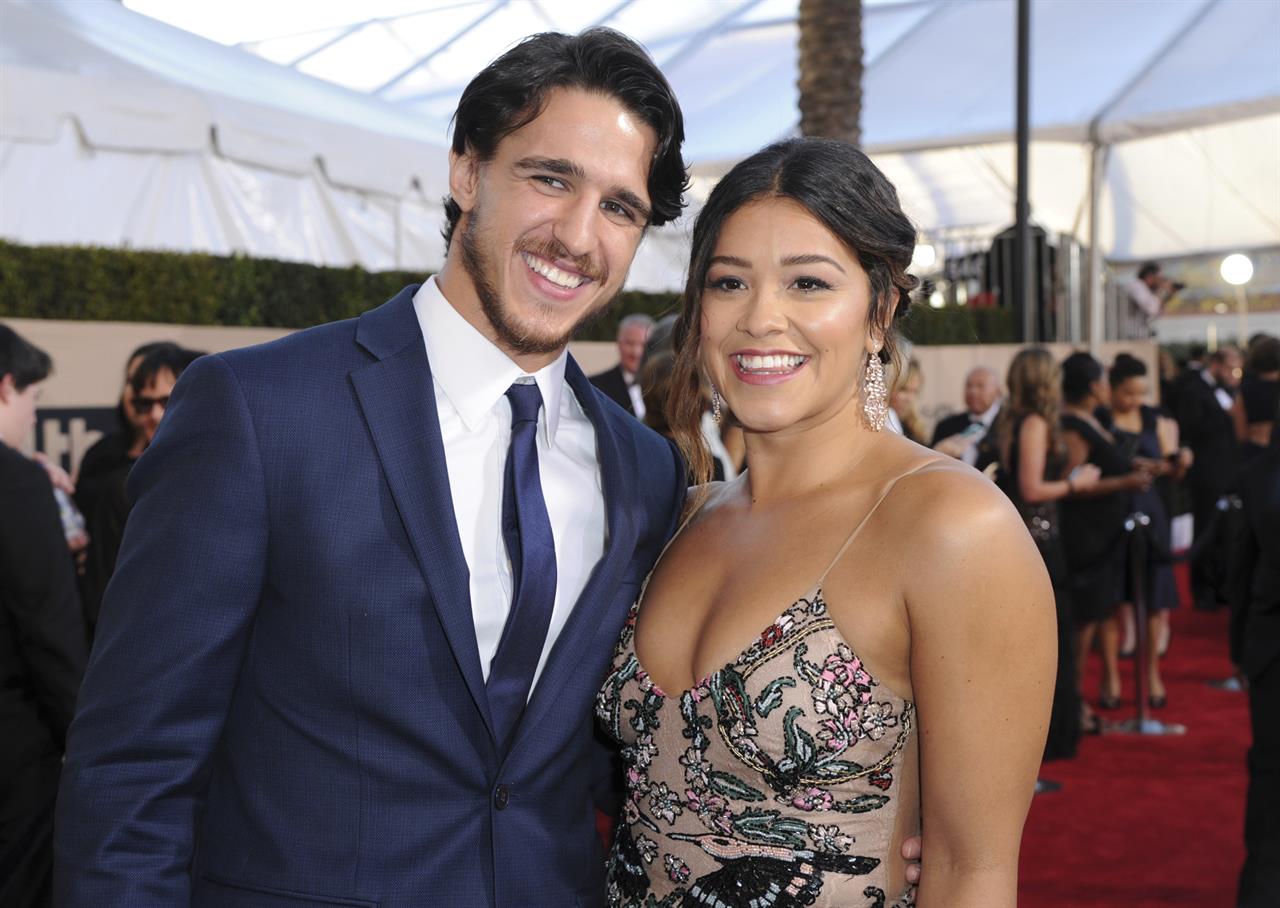Is Gina Rodriguez anti-black?
As someone who has followed The CW’s hit show “Jane the Virgin” since its inception in 2014, naturally, I have been a fan of Rodriguez, who plays the protagonist Jane. I applauded her work breaking barriers for Latinx women and enjoyed her acting. However, ever since Nov. 23 it’s been impossible to ignore thread after thread on Twitter about her disparaging black people. I was forced to ask myself: Is Gina Rodriguez really anti-black, or is this just media hype?
Women’s Pay Roundtable
Although her controversial commentary didn’t go viral until about a week later, on Nov. 16 Rodriguez participated in a roundtable discussion on YouTube about women’s pay with fellow actresses Ellen Pompeo, Emma Roberts and Gabrielle Union.
In the discussion Rodriguez said, “I get so petrified in this space talking about equal pay especially when you look at the intersectional aspect of it, right? Where white women get paid more than black women, black women get paid more than Asian women, Asian women get paid more than Latina women and it’s like a very scary space to step into.”
In response to these remarks, social media and publications lit up with opinions on the matter. Various blogs and niche news sites, such as Grape Vine, ran headlines that read: “Meet Gina Rodriguez, the Latina Actress Who Refuses to Allow Black Women to Ever Be Great.” Many took offense at Rodriguez claiming that black women made more money than Latina and Asian actresses.
The backlash led critics to fact-check her claim by providing the pay for top actresses. Film critic Rebecca Theodore-Vachon responded to the claim on Twitter:
Re: regarding Gina Rodriguez saying Black actresses are paid more than Latinx actresses – Sofia Vergera is the highest paid according to Forbes ($42 .5mil). Kerry Washington is the only Black actress on this list at #8: https://t.co/MrkiGDC0c2
— FilmFatale_NYC 🇭🇹 🇩🇴 🇺🇸 (@FilmFatale_NYC) November 23, 2018
I personally did not agree with this perspective, because I do not think pointing out a few Latinx actresses who make a lot of money is a rebuttal to any claim about Latinx people making less than black people on a whole; a few people do not represent the group.
Others referred to Rodriguez’s erasure of Afro-Latinx women as a point of contention, as her statement failed to address that many people are both Latinx and black. Activist Leslie Mac wrote on Twitter: “Of course Gina Rodriguez was incorrect in her statement (many have pointed out for ex that Sofia Vergara is the highest paid actress in TV) but more disturbing is that her framing continually erases Afro-Latinx Women.”
Of course Gina Rodriguez was incorrect in her statement (many have pointed out for ex that Sofia Vergara is the highest paid actress in TV) but more disturbing is that her framing continually erases Afro-Latinx Women.
— Leslie Mac (@LeslieMac) November 24, 2018
Lydia Blanco also penned an article, titled “As an Afro-Latina, Gina Rodriguez’s comments don’t surprise me,” which highlights Rodriguez’s supposed difficulty in letting black women win.
After hearing Rodriguez’s remarks and reading multiple takes on it, I understood why people were upset. First of all, there is some truth to Rodriquez’s claim at least in terms of overall pay gaps. According to a 2018 National Partnership for Women and Families Study, “Black women are typically paid 61 cents, Native American women 58 cents and Latinas just 53 cents for every dollar paid to white, non-Hispanic men. White, non-Hispanic women are paid 77 cents and Asian women 85 cents for every dollar paid to white, non Hispanic men, although some ethnic subgroups of Asian women fare much worse.”
But instead of comparing the pay gap between Latinx women and white, non-Hispanic men, Rodriguez portrayed black women as “above” Latinx and Asian women. Rodriguez did so in a way that implicitly minimized black women’s hard work and suffering by oversimplifying the situation. She also clearly did not acknowledge the existence of Afro-Latinx women, an erasure that is all too common in both Latinx and other communities. Furthermore, there are people who are both white and Latinx, another nuance Rodriguez does not address.
Based on just her statements in the roundtable, I was hesitant to go as far as to call Rodriguez anti-black, but believed she was clearly lacking an understanding of intersectionality and racial subtleties. But when I found out the roundtable discussion was not the first time the actress had attempted to push aside or disparage the black community, I was forced to reevaluate my opinion.
Interview with Yara Shahidi
In September, Rodriguez went viral based on her comments about black women as well. She and “Grown-ish” star Yara Shahidi participated in an interview to promote their upcoming animated film, “Smallfoot.” Interviewer Xilla Valentine remarked to Shahidi that she was “just goals for so many young black women.”
After dominating the interview from the start, Rodriguez interrupted to interject: “for so many women. Women.” The interviewer made clear in response that while Shahidi is a role model for women in general too, he did mean black women in particular because they “need people on a whole ‘nother level.”
Even if well-intentioned and meant “to express how all women look up to Yara,” as Rodriguez said on Instagram, Rodriguez’s interjection felt too close to a color-blind rhetoric that does not see the uniqueness of black women and their experiences.
https://twitter.com/ActivistaLatina/status/1045703973393641473
Seeing a black woman succeed in a world that says success is unattainable for them is a kind of inspiration distinct from Shahidi’s position as a role model to non-black women. All in all, it was not Rodriguez’s place to speak; she is not a black woman and the question was not for her.
Columbus Superhero Movie
Rodriguez went viral for her remarks on race yet again when in February she said her ideal superhero movie starring actors of color would be about Christopher Columbus’ colonization of the U.S. While speaking to Remezcla, Rodriguez remarked, “I think it would be about Christopher Columbus coming over, the migration of the Spaniards and the influence of the mixes [of people] in South America and in the Caribbean…That’s were [where] my superhero movies would lay, like the 1400 or 1500’s.”
Twitter was quick to point out the actress referred to colonialism, a violent, destructive, oppressive process, as “migration of the Spaniards” and the rape and genocide of black and indigenous people as “the influence” and “mixes” of people. “
this why language so important. & this why i don't take folk like gina seriously. look how afraid latinx are of words like black & african & colonization. the mixes & influences? BE CLEAR: rape & genocide.
— marjua (@_MsEstevez) February 18, 2018
This is yet another instance where Rodriguez erred while talking about race. I couldn’t believe that her ideal superhero movie was really one that sanitized the trauma of black and indigenous people due to colonialism.
“Girls Trip” Tweet
Alas, there’s more. In 2017, Rodriguez reacted poorly to a Twitter thread where black women tried to instruct her on the subtleties of race, representation and film.
On Aug. 3 she retweeted a tweet by Perez Hilton about needing a “Latina version of #GirlsTrip with you. . .” with the comment “What an inspiration #GirlsTrip is for our community. Those women are incredible and I agree this would be f*ck*ng fantastic!.”
https://twitter.com/HereIsGina/status/893143849236807680
Twitter came for the actress once more, claiming she was not only trying to insert herself into the work of black women, but acting like the experiences of black and Latinx women are interchangeable. Her tweet started a long thread of Rodriguez going back and forth with black women commenting to try and assist her in understanding the issue.
I love you Gina, but just please admit there is an issue with inserting. Perhaps that wasn't your intent, but impact matter as well.
— Miss Rona (@heritances) August 11, 2017
https://twitter.com/HereIsGina/status/895819342276829184
Rodriguez still missed the point with her response: “Why not? Why wouldn’t it work? A black family, successful, loving female matriarch with a female lead? Sounds like a great idea to me, no?”
Black women still strived to aid Rodriguez in understanding what she was missing.
https://twitter.com/OhDionne/status/895819944209899520
Ultimately, Rodriguez ended the conversation with one last tweet that I took to be quite frankly, rude.
https://twitter.com/HereIsGina/status/895831108369096704
By saying she was misunderstood, and she’ll keep comments to herself “including praise,” Rodriguez implies that what she said was not damaging. It comes off as if she thinks she is a victim, with the thought process that “no one likes what have to say I guess I can’t talk at all.”
Even though I think her original tweet about a “Latina version” of “Girl’s Trip” was not ill-intentioned, albeit a bit naive, I did not appreciate how she handled the backlash. She refused to acknowledge her part in her offensive words, choosing to verbally pout after numerous black women tried to inform her.
“Black Panther” Tweet
However, the media’s representation of Rodriguez as “anti-black” began on July 23, 2017, after Rodriguez tweeted this:
https://twitter.com/HereIsGina/status/889167374955315200
Twitter users did not take well to the comment, as it was posted in the lead-up to the release of “Black Panther.” People thought she detracted from the groundbreaking nature of the movie’s almost completely black cast with what Katherine Singh calls a “What about us” attitude in respect to Latinx representation. She additionally did not acknowledge Tessa Thompson and Zoe Saldana, Afro-Latinx actresses who starred in “Thor” and “Guardians of the Galaxy,” respectively.
Even though I don’t think Rodriguez’s tweet here was meant to be malicious, it is just one more example of her pattern of making over-simplified claims that either ignores the existence of Afro-Latinx people or references black achievements with a “what about me” response.
In the end, I personally cannot decide for certain whether or not Gina Rodriguez is anti-black. However, she has time and time again stepped on the achievements of black people in a way that erases their work and trivializes the uniqueness of black experiences. She also constantly erases Afro-Latinx people, limiting her narrative of who is “Latinx.”
I believe the actress needs to learn nuance. Instead of comparing black people to Latinx, she should speak about the need for Latinx representation in and of itself. I sincerely hope Rodriguez is able to learn and grow in the future from the many people who are trying to help educate her.
















